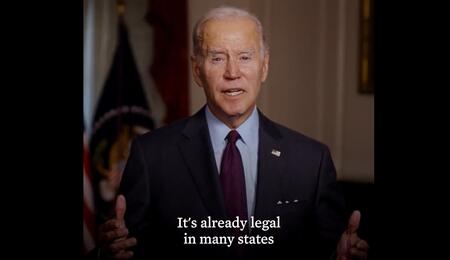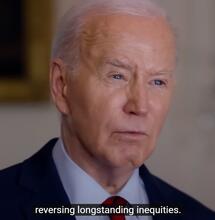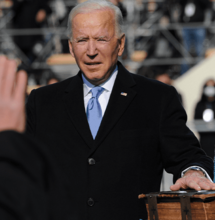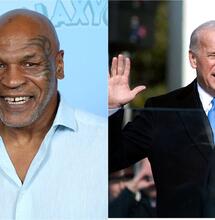Biden Moves Forward with Cannabis Reform

President Joe Biden made an unexpected video address Thursday, Oct. 6, with significant updates on cannabis reform in the U.S. The president said he would mass pardon those with prior federal convictions for the simple possession of marijuana. He also instructed governors to follow steps and do the same for state-level offenses. Third, Biden said he is initiating an administrative process to "review expeditiously" the status of marijuana as a Schedule I controlled substance under federal law.
The president's surprise announcement comes just a month before the November election. It might be prompted by the fact that little progress has been made in Congress for advancing marijuana reform.
The president's announcement is a huge development. He has largely been mute on the subject of cannabis reform ever since assuming office. One can easily count the times with a single hand for each time he has commented on anything related to cannabis during his first two years in office. Nevertheless, marijuana decriminalization was a pledge that Biden made during his presidential campaign, in particular the re-scheduling of cannabis and expungement for low-level cannabis offenses.
In his statement, the President acknowledged the fact that Black and brown people have been disproportionally affected by the War on Drugs. "As I often said during my campaign for President, no one should be in jail just for using or possessing marijuana. Sending people to prison for possessing marijuana has upended too many lives and incarcerated people for conduct that many states no longer prohibit. Criminal records for marijuana possession have also imposed needless barriers to employment, housing, and educational opportunities. And while white and Black and brown people use marijuana at similar rates, Black and brown people have been arrested, prosecuted, and convicted at disproportionate rates," he remarks.
As per the mass pardon he announced, the president said: "I have directed the Attorney General to develop an administrative process for the issuance of certificates of pardon to eligible individuals."
"There are thousands of people who have prior Federal convictions for marijuana possession, who may be denied employment, housing, or educational opportunities as a result. My action will help relieve the collateral consequences arising from these convictions," he added.
As a second measure, Biden urges all Governors to do the same for offenses at the state level. "Just as no one should be in a Federal prison solely due to the possession of marijuana, no one should be in a local jail or state prison for that reason, either," reads the president's statement.
The White House estimates that around 6,500 people with federal marijuana-related convictions could be eligible for relief under the new order. The main target are U.S citizens convicted between 1992 and 2021 of "simple possession" of marijuana under federal law. Thousands of others whose offenses have occurred in Washington, D.C., may also benefit from the directive.
Furthermore, Biden has instructed the Secretary of Health and Human Services, Xavier Becerra, and the Attorney General, Merrick Garland, to review the federal scheduling of marijuana. The process could reverse a decision from 1970, which effectively placed cannabis alongside substances such as heroin and LSD. The Schedule I tag within the Controlled Substances Act means that any drug classified as such has no acceptable medical use and has the highest abuse potential.
In his statement, the president remarked that the current classification of cannabis is "higher than the classification of fentanyl and methamphetamine – the drugs that are driving our overdose epidemic."
Biden has repeatedly faced calls from advocates to use his executive powers and unilaterally initiate the review. While it's unknown how long this process might take, the president emphasized that he wants the agencies to go forward "expeditiously." The process could profoundly change federal marijuana policy, removing cannabis from the strictest classification to a lower category or no schedule at all.
During a background call with reporters before the Thursday announcement, a senior administration official stressed that the president is simply asking for a review and isn't explicitly pushing for rescheduling or reclassifying cannabis to any particular schedule, however.
The White House also said that while Biden is asking for a speedy review process, it will still "take some time because it must be based on a careful consideration of all of the available evidence, including scientific and medical information that's available."
"This is meant to proceed swiftly. But, you know, this has to be a serious and considerate review of the available evidence," the officials said. "So he's not setting an artificial timeline, but he is saying this needs to be expeditious."
A further question from reporters inquired what would happen with "people who are arrested tomorrow for these same crimes," given that de-scheduling or re-scheduling may take some time. Officials answered that "anyone who has committed that offense [simple possession] could not be prosecuted federally, at this point, based on that conduct."
They added: "... there is a proclamation and it is as of today's date. So, if the conduct occurred prior to today, then that would — even if the person has not been charged or convicted, the pardon does cover that conduct."
While concluding the call, the White House officials stressed that "this is an important announcement" that will be "widely disseminated."
"He [President Biden] wants to speak directly to the American people, and this is going to be distributed widely. This is a significant development and it is — or significant announcement that delivers on the President's campaign commitments," the White House officials said.
"Again, right now he is calling on governors to follow his lead. In terms of the next steps, those have not been — we have nothing further to say at this point. But part of calling on governors is because a lot of the convictions are being driven at the state level," they said.









